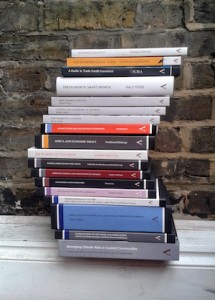 Academic journal publisher profits might not last forever
Academic journal publisher profits might not last forever
Justin Fox’s article at Bloomberg View acknowledges the profits made by journal publishers who don’t have to pay for the content they publish. It examines academic publishing’s history and how journals have taken advantage of the monopoly environment to charge higher prices for journal subscriptions. According to Fox, the open access movement may be changing this model and could replace traditional, large publishers.
Misconceptions about open access still abound
The University of California (UC) press viewed open access as essential to the future of publishing when they began considering it several years ago. Today digital monographs remain relevant to humanities and social sciences, and the UC Press hopes to ‘reinvigorate’ it with a new open access model. But educating and winning over researchers to open access publications is crucial to helping them see its benefits. Some factually erroneously view open access journals as ‘vanity publications in which one must pay to publish’.
Richard Fisher addresses the monograph’s future
In two guest posts for the Scholarly Kitchen, Richard Fisher examines topics with a transatlantic appeal including the permanence of imprints, technological change and monographic demand. Fisher addresses misunderstandings and miscommunications between researchers and publishers.
‘Ebook sales declining’ is not the whole story
The sixth annual Survey of Ebook Usage in U.S. Public Libraries, released last month, indicates that ebooks are becoming more entrenched in public libraries. Although the survey expects that a small percentage of libraries will never offer ebooks, it notes that 94 percent of libraries currently provide ebooks to users. This is down one percent from the previous year, but the article points out that ‘Ebook sales declining’ is a misleading statement.
What do authors really expect from peer review?
Results from a survey sent to hundreds of Taylor and Francis authors show that most authors are still largely supportive of the concept of peer reviewing. However, Phil Davis, the author of this review, finds that it is not the concept of peer reviewing that needs to be evaluated, but rather the ‘toolbox’ of peer reviewing that must be evaluated.
How can scientific publishing become more fair?
The use of publication consultants among scientific publishers has vastly increased over the years, leading to the question of why and how these consultants are used and cited. The Conversation’s article discusses the notion that the use of outside help in publishing should be transparent within the work itself in order to create more fair and transparent publishing system.
Five open access predictions for 2016
Founder and director of Research Consulting Rob Johnson lists five important and thoughtful predictions on the future of open access publishing. Within this, Johnson lists the notion that peer reviewer identities will become more transparent, as well as interactions among authors, editors, and reviewers, a convergence on standard identifiers will emerge, and libraries will become more involved with the process of academic publishing itself.
